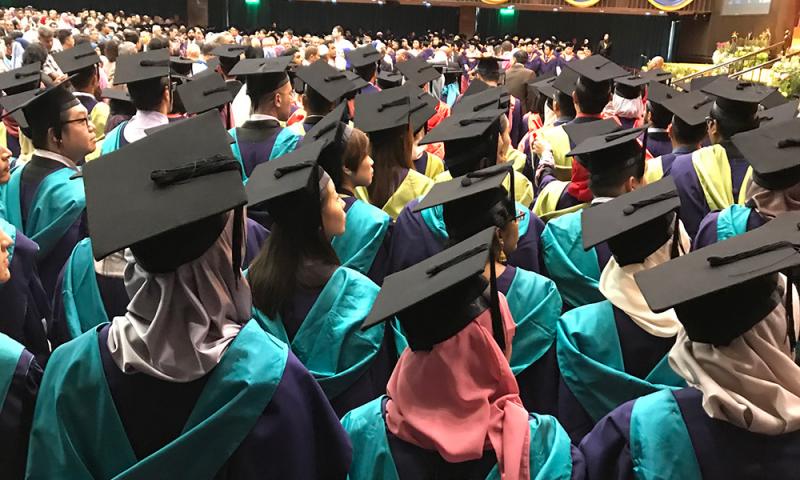MP SPEAKS | Form council to eliminate political interference from higher education
MP SPEAKS | Among the significant issues related to higher education in the country, apart from the Universities and University Colleges Act (UUCA), which restricted academic and student freedom, is political interference in higher education. The mass appointment of politicians leading the Board of University Directors during the Perikatan Nasional era has made political interference in higher education increasingly concerning.
There may be opinions stating that the same issue happened in the short period of Pakatan Harapan rule, which is not valid. Harapan’s efforts to make systemic changes through legislation to eliminate the culture of political interference are distinct. In this article, I will share the strenuous efforts of the Education Ministry (MOE) during the Harapan era to minimise political interference through the re-establishment of the National Council of Higher Education (NCHE) in 2019 and were aborted by the change in the federal government.
In the UUCA years, from 1971 until 2018, political intervention in education was very significant. Among the efforts made by the MOE in the Harapan era to overcome this problem in stages was to implement several changes, both institutionally and operationally, in 2018-2019, including reviving campus elections managed wholly by students and speakers’ corner on campuses, amendments to Section 15 of UUCA, proposed amendments to Act 605 to provide academic freedom to lecturers, the establishment of the Higher Education Institutions Reform Committee, the establishment of the Higher Education Institutions Integrity Committee, the establishment of the Committee for the abolition of UUCA, the establishment of the Students Union Committee, and efforts to revive the NCHE following Act 546 (1996).
Among these efforts, the most significant action is the re-establishment of the NCHE to guide the higher education sector to a more independent and professional level.
Through continuous management sessions, the MOE has received numerous proposals from stakeholders related to higher education. Among the suggestions and prompts received by MOE at that time from academics personally and organisations representing academics are to revive the NCHE.
MOE has agreed to the proposal and set the year 2020 for the formal establishment of the council after preparations for it were held throughout 2019. Finally, in my serial letter MOE in October 2019, I directed the general secretary of MOE, Ghazali Abas, to immediately establish the NCHE.
The NCHE is stipulated in the National Council of Higher Education Act 1996 (Act 546) in which section 12(1) states that the functions of the council are:
(a) to plan, form and determine national policies and strategies for the development of higher education;
(b) to coordinate the development of higher education;
(c) to develop and facilitate the structured growth of higher education institutions;
(d) to determine policies and set criteria for allocating money to higher education institutions;
(e) to determine policies related to the admission of students to higher education institutions;
(f) to determine policies and set guidelines on matters related to the structure of salary and university and college staff management systems established under the UUCA;
(g) to determine the basis and establish guidelines on the structure of fees;
(h) to determine policies and set guidelines on areas or courses of study undertaken by higher education institutions;
(i) to determine the policy and set guidelines on the course of any studies or training programmes by higher education institutions jointly or in conjunction with, mergers or otherwise with any university or higher education institution or education institutions or other organisations within or out of Malaysia;
(j) to determine the policy and establish guidelines on the involvement of the university in business activities per the powers conferred under the UUCA; and
(k) to take any action or do other matters deemed required or necessary to ensure the effectiveness of carrying out the functions and powers.
Section 12 (2) also states, “When the national policy, strategy, and guidelines are formed and determined by the council concerning its functions under paragraph (1) (a) to (k), the minister shall implement the appropriate policies, strategies, and guidelines. [It is permissible to add the membership category of NCHE members – demonstrating the membership is free of political influence and centred on the importance of opinions from professionals. The membership category is stated in Act 546]
Perhaps some may ask, is the National Education Advisory Council (NEAC) not already in place to advise the minister and MOE officials on educational issues. Why is there a further need to go to the NCHE?
Referring to the sections submitted in Act 546, it is clear that the NCHE function varies and does not overlap with the NEAC. I refer to Section 11 of the Education Act 1996 (Act 550) stating the functions of the NEAC:
(1) Ministers can refer to matters related to education to the NEAC to receive their advice.
(2) The NEAC must consider the issue and submit their advice to the minister when any matters are referred under the sub-section (1).
Therefore, Act 550 does not define the NEAC’s role in higher education. Although Act 550 states “the minister’s responsibilities for higher education” under section 70. However, it is preserved in other laws on higher education: Act 546, Act 555, Act 556 (Abolished), Act 679, and UUCA.
Due to the reasons mentioned above, the MOE in the Harapan era has embarked on an effort to reactivate the NCHE to realise the administration’s aspirations for a competent and internationally recognised higher education sector. This effort was prompted by the Malaysian Academic Movement (Gerak) through its chairman in May 2018, Prof Dr Zaharom Naim.
The reason is to create a gap between higher education and the influence of politics and politicians. Based on Section 4 (a-i) in Act 546, the council’s establishment was given to the general secretary and MOE’s top leadership in November 2019. Its establishment effort has been handed over to the secretariat chief according to section 20 of the Act, which states: “A secretariat to be established from the Higher Education Department of the Education Ministry shall assist the council in carrying out its functions.”
Prof Mohd Saleh Jaafar, deputy director-general of higher education, was appointed to lead the secretariat for his capacity to hold the position of director-general of higher education, which was moved to the science ministry. He formed an administration comprising the majority of academics and several representatives from the industry without involving any individual from political parties. This effort is expected to be a success for the people’s hopes to see institutes of higher learning in Malaysia that are free from systemic grip and influence.
Unfortunately, with the change of government, this was not accomplished. Even Prof Mohd Saleh Jaafar, who chaired the secretariat, had been terminated immediately. Quite depressing to say, the Higher Education Ministry, led by Noraini Ahmad and his deputy, Mansor Othman, have not even looked into this issue as if it is not their priority. So, right now, MOE should be pressured to continue this effort to restore the authority and integrity of higher education in Malaysia.
MASZLEE MALIK is Simpang Renggam MP and former education minister.
The views expressed here are those of the author/contributor and do not necessarily represent the views of Malaysiakini.
RM12.50 / month
- Unlimited access to award-winning journalism
- Comment and share your opinions on all our articles
- Gift interesting stories to your friends
- Tax deductable

 Maszlee Malik
Maszlee Malik